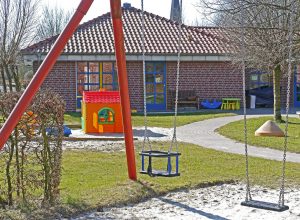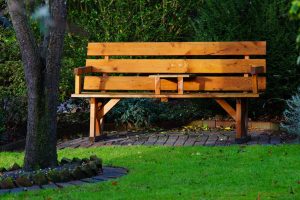Children are incredibly curious creatures, so it should be no surprise to you that they find gardens absolutely fascinating. After all, they’re filled with toys to play with, dirt to dig in, and interesting bugs to look at. Most parents love spending time with their children outside, but it’s difficult to fully enjoy your garden when you’re constantly on the lookout for danger and potential hazards. As wonderful as they can be, gardens come with a number of risks, especially to little ones, so it’s important that every landscape decision you make has your entire family in mind. Here are ten ways you can create a garden your whole family can enjoy.
RELATED POST: Make a Patio Vegetable Garden this Summer
Keep It Locked Up
You’re not going to be able to enjoy your garden if you constantly have to watch your children while they play, so you need to make sure that it is as secure as it can be. Go around the entire perimeter and make sure that every fence panel is solid and strong and that every gate is locked. This means that your children won’t be able to wander out whenever they feel like it. Even if your kids are old enough to know better, doing this also means that other people can’t get in.

Put Gardening Tools Away
Many people choose to leave their gardening tools leaned up against a wall. Or they lay them in a pile on the ground. But when you have children running around, this isn’t the safest option. Kids like to mimic their parents. So if they see these tools lay around, regardless of how big or dangerous they are, they might try to use them. Because of this, it’s important that you put these away somewhere safe. Preferably you should put them in a shed or tool store that you can lock with a key.

Make Water Features Safe
Adding a water feature or two can really transform your garden. But with small children running around, most parents opt against having any at all. Thankfully, you don’t have to miss out, as there are plenty of ways to make your water features safe. For example, with a pond, you could put a fence or gate around it. Or you can install a grid over the top to keep kids at a safe distance. There are also a number of child-friendly water features you could fit, like bubble fountains.

Consider Laying Artificial Grass
When you have children that play outside all year long, artificial grass is often a much better choice than the real thing. After all, it’s tough and durable. So you don’t have to worry about it being ruined by your kids playing football or riding their bikes. You also won’t have to deal with muddy shoes or annoying grass stains. You can also install a safety surface underneath your grass, so your children have a much softer landing if and when they fall over.
Know What You’re Planting
Having artificial grass doesn’t mean that you can’t have a flower bed, but you do need to make sure that whatever flowers you plant are safe for children. There are a number of common plants, like daffodils and lilies, which look beautiful in your garden but can cause some serious harm to your little ones. Because of this, it’s important that you do plenty of research and know what you’re planting before you start.

Create Child-Specific Areas
If your kids have areas in your house for them to play, then why wouldn’t you create space in your garden for them to do the same? Whether it’s a place to play football, a climbing frame, or a sandbox, designing areas specifically for your children can make a huge difference. You may also want to hire patio builders to construct somewhere for your children to relax and play out of the sun. Speak to your kids and see what sorts of things they’d want their space for.
Install A Sunken Trampoline
Nothing keeps children (and parents) entertained quite like a trampoline. So it would make sense to place one somewhere in your family-friendly garden. Unfortunately, most trampolines take up a lot of space. This is why many parents opt against getting on for their kids. Thankfully, you always have the option to install a sunken trampoline. As they’re on the ground, these are a lot safer for your children. They are also a much more subtle option for your garden.
Multi-Tasking Furniture
Unless you have a huge garden, a swing set can take up a lot of room. It can completely overcrowd what little space you have. Fortunately, to kids, anything that swings is deemed as a swing. So instead of going out and buying a huge swing set, multitask your furniture and buy a beautiful swing seat instead. This will take up much less room and is something you and other family members can relax on when your kids aren’t using it. The same idea also works for hammocks and rockers.
Make Space For Adults
Children tend to take up a lot of space, but you shouldn’t surrender your entire garden to them. Instead, make sure that you create a private area just for you, your partner, and any other adults you invite over. This should be somewhere quiet and away from the children, where you can truly relax. This space can be anywhere you want it to be. For example, a seating area near the pond or a raised patio. Just make sure that your children know to respect your space as you do theirs.

Don’t Aim For Perfect
Whether you like it or not, your garden is never going to look like a picture in a gardening magazine. These spaces aren’t lived in, so you can’t expect yours to look the same. Instead, simply aim for a garden that makes each and every member of your family happy. It doesn’t necessarily have to look the best, as long as it works for your needs. Of course, you should try to keep the space tidy. But don’t worry about it getting a little wild now and then.
Creating a family-friendly garden isn’t always easy. But hopefully, with the tips above, you’ll find the task a little more straightforward.
Editor’s Note: Our contributor today shares some awesome ideas to make gardening with children a lot of fun. What have you tried that works for your children?
- Are Geraniums Annual or Perennial? - 09/21/2024
- DIY Home & Garden: Featured on ApartmentGuide - 09/21/2024
- Bacon: Creative Uses That Go Beyond the Breakfast Table - 09/08/2024



Comments are closed.